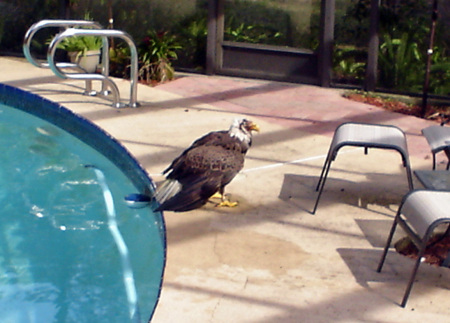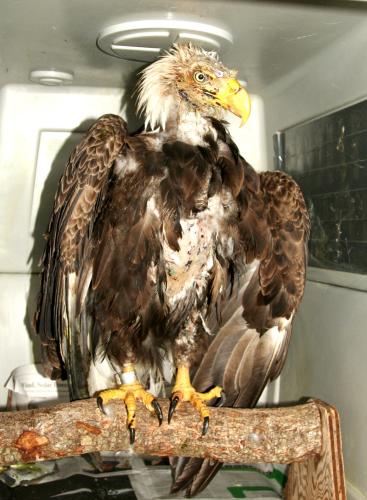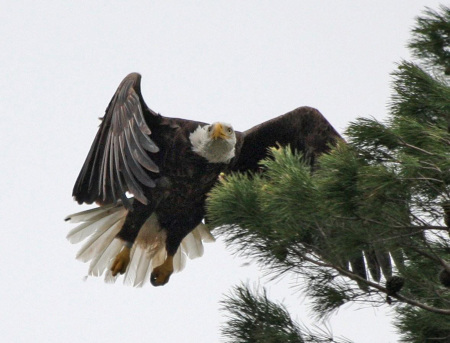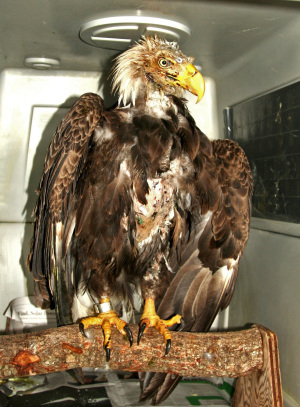Palm Harbor, FL: Two females, one male bald eagle fight over mating nest
Palm Harbor, FL: Two females, one male bald eagle fight over mating nest
|
Administrator
|
This post was updated on .
Barbara Walker sent this to us:
Really great quotes from Lynda White!!! Wonderful that they were able to speak to Mr. Fernandes as well!!!  Two females, one male bald eagle fight over mating nest By Rodney Thrash, Times Staff Writer In Print: Wednesday, December 2, 2009 A bald eagle rests by the Fernandes’ pool after a beating from a combative female. A bald eagle rests by the Fernandes’ pool after a beating from a combative female. [RUSS FERNANDES | Special to the Times] PALM HARBOR — He's everything she's ever wanted in a man: distinguished, a caretaker, a homeowner. She'll do anything to get him, even if that means taking out his better half. That's exactly what the hussy tried to do Saturday, authorities said Tuesday. No, this isn't a recap of Fatal Attraction, the famous 1987 movie starring Glenn Close and Michael Douglas. And the characters aren't people. This love triangle is playing out in the trees above a Palm Harbor neighborhood. The parties involved? Bald eagles. According to officials at the Audubon Center for Birds of Prey in Maitland — eaglespeak for the hospital — the man-stealing flirt held the other bird down, plucked her feathers and almost killed her. The injured eagle weighed all of 9 pounds. "Her chest looks like a Thanksgiving turkey — completely bare," said Lynda White, coordinator of the center's EagleWatch program. "She is beat up. She is just a mess." No one knows if the male eagle was around at the time of the fight, but typically, mates don't come to one another's rescue, she said. It all happened Saturday afternoon in the back yard of Russ and Becky Fernandes. "My dog was barking like crazy out back," Russ Fernandes said. "I went out and looked. The eagle was out on the ground." Bloodied and weak, she stood outside the lanai until he opened the screen door. Then she stumbled inside and into the pool. He fished her out and notified the Suncoast Seabird Sanctuary, an Indian Shores bird rescue organization that later transported the eagle to the center in Maitland. It will be several months before the eagle's feathers grow back and the center releases her. That's a good thing. "She'd just get her rear beat up again probably," White said. Reports of eagle fights increase this time of year. Nesting season, which started Oct. 1, doesn't end until May 15. During that time, the birds jockey for places to live. In Pinellas County, where development has paved over habitats as the eagle population has soared, the problem is even more acute. "The birds in Pinellas are suffering from loss of habitat," White said. "That's why you have so many eagles there nesting on cell towers. It's crazy compared to the rest of the state. We have seen a steady increase in territory fights as population increases and territory decreases and I think that this is a classic example of that." The offending eagle is still on the lam and has shown no signs of remorse. Three times since Saturday's nearly fatal fight, she has tried to move into the injured eagle's home, said Barb Walker, a local volunteer with the Audubon of Florida EagleWatch program and one of the first people Fernandes called. "She wants that nest, that house, that man," she said. Added White: "She's probably thinking to herself, 'Why should she go out and find a mate from scratch when she's found a ready made home for herself?' " So far, the male eagle has rebuffed the young lady's advances. And now, they're going at it, too. Despite the domestic squabbling, she still wants him. "She tries to fly to the nest and he won't let her in," Walker said. "He's fighting her off and chasing her out of the natal territory. It's a real drama playing out over there." Drama seems to follow the injured eagle. Someone shot her in January 1996, fractured her right ulna and punctured her femur. She was so badly injured that the Audubon center kept her for two years while she recuperated and regained her strength. The center released her 6 miles northwest of Brooksville on Feb. 24, 1998. "We hadn't heard from her since," the center's Dianna Flynt said in an e-mail Sunday to Walker. White said the male eagle can only fend off the female's advances for so long. Eagles take turns incubating. While one sits on the eggs, the other feeds itself, returns to the nest and exchanges roles. "Raising chicks is a two-parent job and this bird cannot continue to feed itself and keep the eggs warm," she said. "I wouldn't be surprised if he finally realizes this would be a lot easier if he had help. I'm thinking he's going to get really tired of this routine very quickly and she will move in." "They live these soap opera lives," Walker said. "It's almost as if they were people." Rodney Thrash can be reached at rthrash@sptimes.com or (727) 445-4167. Barb Walker Palm Harbor, FL
Ken Schneider
Web site: http://rosyfinch.com Blog: http://rosy-finch.blogspot.com Photos: <http://flickr.com/photos/rosyfinch> |
Re: Plam Harbor, FL: Two females, one male bald eagle fight over mating nest
|
Administrator
|
Link to the original article in the Tampa Bay News:
<a href="http:// http://www.tampabay.com/news/environment/wildlife/two-females-one-male-bald-eagle-fight-over-mating-nest/1055764 ">http:// http://www.tampabay.com/news/environment/wildlife/two-females-one-male-bald-eagle-fight-over-mating-nest/1055764
Ken Schneider
Web site: http://rosyfinch.com Blog: http://rosy-finch.blogspot.com Photos: <http://flickr.com/photos/rosyfinch> |
|
In reply to this post by NewMexiKen
This morning I was talking to a guy who was asking me about the eagles. He lives in northern VA and sees eagles all the time and watches their nests. He was telling me the story of a pair he had watched for years and just like this story, Ken, another new female tried to move in on the nest. The first time they fought and the volunteers followed her wounded and found her and got her help in time to save her. When she healed they took her back and released her off a bridge near the nest. Things were back to normal for a short time and then the second female returned and this time when they fought the original eagle was killed.
I was really upset hearing the story and then to see a similar one on the forum today involving another pair is really chilling. I wonder if there are more females than males? There are areas in Alaska where you see many adults congregated. I wonder if this sort of thing happens more often there? |
Re: Palm Harbor, FL: Two females, one male bald eagle fight over mating nest
|
Administrator
|
In reply to this post by NewMexiKen
Barbara Walker forwarded this e-mail and photo from Lynda White--
Barbara writes: Hi This is the photograph of the Bald Eagle which was rescued at Mr. Fernandes house on Saturday. Please see Lynda's comment below. Joe Zarolinski, Barb Crandell, Jackie Williams, Joan Brigham and I interviewed with 10 Connects today. They expect the segment to air at 5. Here is the productivity of North Pinellas nests over the last 5 - 6 years [number of eagles fledged each year]. In looking at the figures it certainly isn't surprising that we are seeing so much conflict. 03/04 - 23 04/05 - 15 05/06 - 18 06/07 - 27 07/08 - 11 08/09 - 23 There was another fight on the east side of Lake Tarpon this afternoon as well. The two eagles fought and then landed in a friend of mine's backyard. There were feathers flying and the two eagles rested there on the ground for approximately a half an hour. This was about 4/10's of a mile from the Lansbrook nest which can only be surveyed by boat or air. Lynda writes: Here she is-the poster girl for habitat loss in Pinellas County:  Lynda White EagleWatch Coordinator Audubon Center for Birds of Prey 1101 Audubon Way Maitland, FL 32751 407-644-0190 x 106 407-644-8940 fax http://www.audubonofflorida.org/who_centers_CBOP_eaglewatch.html "Never doubt that a small group of thoughtful, caring citizens can change the world. Indeed, it's the only thing that ever has." Margaret Mead Celebrating 30 years of Raptor Rehabilitation, Conservation and Education in Central Florida.
Ken Schneider
Web site: http://rosyfinch.com Blog: http://rosy-finch.blogspot.com Photos: <http://flickr.com/photos/rosyfinch> |
Re: Palm Harbor, FL: Two females, one male bald eagle fight over mating nest
|
Administrator
|
In reply to this post by NewMexiKen
To us, it seems tragic that this male eagle continues trying to incubate the eggs alone, apparently not eating or drinking, all the while fighting off the interloping female. For wild creatures, the survival instinct extends beyond the individual to its progeny. The male defends his genetic line, while the female would almost surely destroy the eggs immediately if she could overcome and woo him.
All too often we interpret the behavior of wild things in human terms. By definition, only humans can be "inhumane." In Wikipedia we find: "Humane in early use meant civil, courteous or obliging towards humans and animals. In modern times it is characterized by sympathy with or consideration, compassion and benevolence for others, especially for the suffering or distressed." Also, "Humans are innately inhumane; this explains much of the misery and suffering in the world." Early naturalists often classified wild creatures as either "good" or "bad," usually in terms of how they affected human interests such as farming, ranching, hunting and fishing. Arguments for and against persecution of "bad" animals often relied upon the effect they had on other "good" and "bad" creatures. Thus, the "bad" hawk that took chickens may have been partially redeemed because it killed "bad" rodents. Forgotten is the inherent complex and violent struggle within the Web of Life. When the Bald Eagle was selected as our National Symbol, the founding fathers overlooked some of its "bad" traits, and mostly considered its appearance. Catherine Raven, in Beauty is Only Feather Deep asks, "Was the bald eagle really the best choice of national symbol? A closer look at the habits and evolutionary lineage of this American icon casts doubt." Raven describes a group of tourists in Yellowstone National Park as they admired the flight of a Bald Eagle high overhead, being pursued by a raven. A protracted fight ensued during which time the relatively small raven demonstrated agility, tenacity, and bravery (a judgment that any bird expert would confirm as unbiased, my surname notwithstanding). The bald eagle demonstrated the better part of valor and fled. She celebrates the raven's victory, and muses: [H]ad I shown up 200 years earlier, when the only people in the valley were Indians. In those days, a person could choose to raise a hand to honor either the raven's skillfulness or the bald eagle's beauty. But the most revered bird in this area would likely have been the golden eagle (Aquila chrysaetos). Countless natives probably rode through this valley with golden eagles painted on their horses. Today,tourists ride through with bald eagles painted on their motorcycles. Raven quotes Arthur Cleveland Bent, from his 1937 classic, Life Histories of North American Birds of Prey: "A fine-looking bird," Bent writes of the bald eagle, but "hardly worthy of the distinction [of being the national emblem]. Its carrion-feeding habit, its timid and cowardly behavior, and its predatory attacks on the smaller and weaker osprey hardly inspire respect." Bent's baldies-behaving-badly exposé also reveals that our nation's icon relishes vulture vomit. It's not that they find the vomit lying around; rather, they seek out vultures and force them to vomit. Then they eat the regurgitate. "Our national bird may still be admired," Bent suggests, "by those who are not familiar with its habits." Raven continues: The transfer of allegiances [away from the Golden Eagle and the Wild Turkey] began with Thomas Jefferson, who appointed the bald eagle to serve as the national emblem for the new American nation. It was a classic example of the outdated practice of physiognomy. Now considered a pseudoscience and an excuse for racism, advocates of physiognomy held that a person or animal's true nature was revealed by its outward appearance. Because of its white head and yellow eyes, physiognomists concluded that the bald eagle was fierce and noble. To his credit, Benjamin Franklin, the scientist, rejected this false logic, recognizing that the baldie was, in fact, a pirate and worse still, a "rank coward, commonly fleeing birds the size of sparrows." Franklin suggested that the turkey, a bird of many virtues, be used for the emblem instead. But Franklin's arguments didn't prevail: It seems our young nation was more concerned with symbolism than natural history, and the turkey had less charisma than the eagle. Follow this link to Catherine Raven's full essay, in which she explains how its fine appearance saved the Bald Eagle from extinction in the lower 48 states. The page includes a fanciful rendition of the Great Seal of the United States, as it would look if the Wild Turkey had won out over the Bald Eagle. In Life Histories, Bent extols the Golden Eagle's beauty: This magnificent eagle has long been named the King of Birds, and it well deserves the title. It is majestic in flight, regal in appearance, dignified in manner, and crowned with a shower of golden hackles about its royal head. When falconry flourished in Europe the golden eagle was flown only by kings. Its hunting is like that of the noble falcons, clean, spirited, and dashing. It is a far nobler bird in every way than the bald eagle and might well have been chosen as our national emblem. But then the golden eagle is not a strictly American bird, as the bald eagle is. We don't think twice when a robin pulls up a worm, or an Osprey catches a fish, but the predator-prey relationship can stir up strong emotions, from pity for the victim, to anger and even hate for the aggressor. The following video is not for the faint-hearted, or to those who find it hard to accept violence, so be forewarned. A Golden Eagle displays remarkable hunting strategy, preying on mountain goats much larger than itself by throwing them off the cliff face. Remarkably, the goats aggressively defend their kids. http://www.youtube.com/watch?v=nQ4HCwKXuVM
Ken Schneider
Web site: http://rosyfinch.com Blog: http://rosy-finch.blogspot.com Photos: <http://flickr.com/photos/rosyfinch> |
Re: Palm Harbor, FL: Two females, one male bald eagle fight over mating nest
|
Administrator
|
Lynda White responded to my post:
The male will eventually give in to the urge to successfully rear young. When a mate is lost, the survivor must find another, for the urge to reproduce is a powerful one. I suspect that these eggs are no longer viable, since the male has left the nest to feed himself. His vocalizing has called in several possible replacements, and he should soon allow one to claim a place at the nest. It is early in the season, and there is plenty of time to reclutch and raise offspring. The injured eagle will miss nesting season, a good thing in this case. When she is released in the spring the fledglings and adults will be gone and she should be safe-at least until nesting season rolls around again. Lynda White EagleWatch Coordinator Audubon Center for Birds of Prey 1101 Audubon Way Maitland, FL 32751 407-644-0190 x 106 http://www.audubonofflorida.org/who_centers_CBOP_eaglewatch.html "Never doubt that a small group of thoughtful, caring citizens can change the world. Indeed, it's the only thing that ever has." -Margaret Mead
Ken Schneider
Web site: http://rosyfinch.com Blog: http://rosy-finch.blogspot.com Photos: <http://flickr.com/photos/rosyfinch> |
|
That sums it up. Barb From: NewMexiKen [via Bald
Eagles of Broward County, Florida]
[mailto:[hidden email]] Lynda White responded to my post: Ken Schneider This email was sent by barbibird
(via Nabble) |
|
In reply to this post by NewMexiKen
Wow! I had not heard of such behavior until now. Hope the P. Pines nest "couple" is ok.
|
RE: Palm Harbor, FL: Two females, one male bald eagle fight over mating nest
|
Administrator
|
In reply to this post by barbibird
Latest from Barbara:
Several people have inquired about the PI18 male. He was not at the nest this morning [December 4] so it appears he has abandoned the eggs in the nest. He did allow a female to perch nearby for a short time but then flew away. A different pair of young eagles was observed at the nest and Joe thought it might be possible that an entirely different pair takes over the nest. Barb Walker Palm Harbor, FL Here is an earlier article with photos http://www.myfoxtampabay.com/dpp/news/local/1203-bald-eagle-attack#54403716-2
Ken Schneider
Web site: http://rosyfinch.com Blog: http://rosy-finch.blogspot.com Photos: <http://flickr.com/photos/rosyfinch> |
RE: Palm Harbor, FL: Two females, one male bald eagle fight over mating nest
|
Administrator
|
Barb provided this interesting follow-up today. The fireworks at the nest just might not be over!
The bald eagle which was rescued north of PI27 will be released this week. He made an fabulous recovery! He had a broken scapula. This was the week before our girl from PI18 got beat up. Most likely he will be released at Ahhochee Hill Audubon Center within the next couple of days. A celebrity release is planned. Hopefully, if this eagle was the intruder and not the original male then he'll like the extra room in Brooksville. If it is the original male I suspect he'll come back here anyway and find his female incubating with another male. Yikes. Barb Walker Palm Harbor, FL
Ken Schneider
Web site: http://rosyfinch.com Blog: http://rosy-finch.blogspot.com Photos: <http://flickr.com/photos/rosyfinch> |
Re: Plam Harbor, FL: Two females, one male bald eagle fight over mating nest
|
In reply to this post by Trisha
I think territory fights are more common in Florida than in Minnesota and Alaska. The eagles are confined here. They have less space, fewer options.
|
UPDATE: Eagle rescued in Palm Harbor mends well at Maitland Audubon Center
|
Administrator
|
Eagle rescued in Palm Harbor mends well at Maitland Audubon Center
By Rodney Thrash, Times Staff Writer In Print: Saturday, January 9, 2010  The bald eagle Russ and Becky Fernandes rescued from their Palm Harbor back yard seen during better times. This eagle also reportedly spent two years at the Audubon’s Maitland facility in the late 1990s after being shot.  The rescued eagle looks plucked after its fight with another female. Full story PALM HARBOR The bald eagle who was plucked from her nest and pummeled by a home-wrecking flirt in November is on the mend. According to an official at the Audubon Center for Birds of Prey in Maitland, the eagle's chest no longer looks like a Thanksgiving turkey. "Well, I would say that she looks like the Rogaine is working," said Lynda White, coordinator of the center's EagleWatch program. "Most of her feathers have begun growing back." That's a good thing, she said. Not only are they used for flying, chest feathers keep eagles insulated. "Like now," White said, "when the weather is so cold. The birds use those feathers to keep them warm." The eagle was in bad shape when she arrived at the center after a lover's quarrel in a Palm Harbor neighborhood. As recently as December, White estimated it would be several months before the feathers grew back. The bird is recovering ahead of schedule, White said, but she isn't in the clear. There are still two areas of concern: deep puncture wounds on her beak and on her leg. "They are healing, but it's been a slow process," White said. "She still needs daily care, so she will be in the clinic for a while longer before being sent outside to rehab." On Rolling Woods Drive, where the soap opera played out, EagleWatchers continue to keep an eye on developments at the nest. "There have been reports that the male eagle is attempting to bond with a younger female," said Barb Walker, a local volunteer with the Audubon of Florida EagleWatch program. She doesn't know if that younger bird is the same eagle that almost killed the injured one. "After the fight, there were several suitors," Walker said. "I don't know that it's going real strong for them." Friday morning, she said, the male bird was alone. "When eagles are courting, they go through an amazing display," Walker said. "We haven't seen the bonding that we'd see: perching together, beak rubbing. There has not been any courtship display." Rodney Thrash can be reached at rthrash@sptimes.com or (727) 445-4167. [Last modified: Jan 08, 2010 08:08 PM
Ken Schneider
Web site: http://rosyfinch.com Blog: http://rosy-finch.blogspot.com Photos: <http://flickr.com/photos/rosyfinch> |
| Free forum by Nabble | Edit this page |

